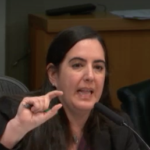Three lobbyists appointed last month to the Miami 21 Ad Hoc Task Force, which is to make recommendations to change the city’s 10-year-old zoning master plan, have raised eyebrows because they represent dozens of development clients before the city — and some of the biggest and most controversial projects or proposals.
Vicky Leiva of Bilzin Sumberg — ex wife of county lobbyist and Carlos Gimenez crony Ralph Garcia-Toledo — was  appointed by Commissioner Manolo Reyes, although she has registered to lobby for 69 clients at the city, including All Aboard Florida, Parrot Jungle and Gardens, the River Landing development, Genting, the casino people, the controversial Ferris wheel at Bayfront Park and Eastside Ridge, a 22-acre development that would raze homes in Little Haiti and replace them with mixed-use towers (rendering), that sued the city’s planning and zoning appeals board in November. Last month, she refused for the umpteenth time s request from the PZAB board to let residents meet with the developer to go over concerns. In 2009, she fought against the impacts that Miami 21 would have for another one of her clients.
appointed by Commissioner Manolo Reyes, although she has registered to lobby for 69 clients at the city, including All Aboard Florida, Parrot Jungle and Gardens, the River Landing development, Genting, the casino people, the controversial Ferris wheel at Bayfront Park and Eastside Ridge, a 22-acre development that would raze homes in Little Haiti and replace them with mixed-use towers (rendering), that sued the city’s planning and zoning appeals board in November. Last month, she refused for the umpteenth time s request from the PZAB board to let residents meet with the developer to go over concerns. In 2009, she fought against the impacts that Miami 21 would have for another one of her clients.
Iris Escarra of Greenberg Traurig, who was appointed by Commissioner Keon Hardemon — who is termed out this year and is running for county commission — has registered to lobby at the city for 69 clients she does zoning entitlements and zoning change applications for, including Outboard Media, Miami Freedom Park, Miami Beckham United, Mater Academy and Grove Isle Investments. She is a director at the Latin Builders Association and was assistant city attorney at the city of Miami from January of 2002 to December of 2004.
And Melissa Tapanes Llahues, who became a named partner at Bercow Radell Fernandez Larkin & Tapanes in January and was also appointed by Reyes, has registered to lobby for 75 different entities, including the Bab ylon, which last year got approval for 24 stories on property zoned for a maximum of eight. Reyes voted in favor. Mayor Francis Suarez vetoed it. Tapanes has nine pages worth of clients listed on the city’s lobbyist information website. Babylon International is only one.
ylon, which last year got approval for 24 stories on property zoned for a maximum of eight. Reyes voted in favor. Mayor Francis Suarez vetoed it. Tapanes has nine pages worth of clients listed on the city’s lobbyist information website. Babylon International is only one.
And she is pals with the wife of new City Manager Art Noriega. Tapanes is not only at a law firm that heavily contributed to Reyes’ campaign, she is also a board member of the Latin Builders Association with Michelle Pradere Noriega, COO of Pradere Office Products, who also co-owns a company called Cinco Strategies with her husband. The two girls are tight. The first photo shows her (second from left with a circled head) at Michelle’s baby shower. And the second photo is more recent, from the LBA gala last month.
Michelle Pradere Noriega, COO of Pradere Office Products, who also co-owns a company called Cinco Strategies with her husband. The two girls are tight. The first photo shows her (second from left with a circled head) at Michelle’s baby shower. And the second photo is more recent, from the LBA gala last month.
Reyes would not return several calls and texts to ask if Noriega nudged him to appoint Tapanes.
Last summer, when Reyes voted to triple the allowable height for her client — they really wanted to go up 48 stories, but were kind enough to cut it in half — Tapanes argued that the Babylon property had been unfairly downzoned by, drumroll please, the adoption of Miami 21. She calls it a mistake. So her motivation is to correct that mistake, no?
Read related: New Miami manager Art Noriega is approved — $310K in family therapy
Noriega did not return several calls and texts, even though Ladra told him it was unrelated to the coronavirus (maybe because). Reyes doesn’t answer the phone or return my calls anymore since Ladra said he was either being disingenuous with his support of the anti-recall ordinance or he did not understand it well and was being sold a bill of goods.
Ultimately, it doesn’t matter whose bad idea it was. Activist Attorney David Winker says the appointments violate the Florida Code of Ethics for Public Officers and Employees, Statute 112.313, section 7, which states, in part: “No public officer or employee of an agency shall have any employment or contractual relationship with any business entity or any agency which is subject to the regulation of, or is doing business with, an agency of which he or she is an officer or employee…. Nor shall an officer or employee of an agency have or hold any employment or contractual relationship that will create a continuing or frequently recurring conflict between his or her private interests and the performance of his or her public duties or that would impede the full and faithful discharge of his or her public duties.”
Public officer includes appointed members of a city’s task force, which is considered an agency because it will take testimony and make recommendations that could become new law.
It also flies in the face of reason.
“In order to recommend changes that will improve the Miami 21 zoning code, the Miami 21 Task Force must be structured to  ensure that its final recommendations make Miami 21 better… not better for certain people,” Winker wrote in a letter to City Attorney Victoria Mendez in late February.
ensure that its final recommendations make Miami 21 better… not better for certain people,” Winker wrote in a letter to City Attorney Victoria Mendez in late February.
“A critical component to the task force is ensuring that the decision-makers are making recommendations in the best interests of all of Miami, not just in the best interest of their clients. Any perceived bias of task force members will affect the validity of the final recommendations and impugn the integrity of their acceptance in the community,” Winker said.
In other words, these girls are tainted. And their involvement will taint the whole process.
In January, the City Commission created a 12-member review ad-hoc task force to recommend changes to Miami 21, a zoning guide for the city created 10 years ago to address sea level rise, affordable housing and development density. The structure was to include real estate developers and land use attorneys — which seems sort of contrary, unless there are any land use attorneys who don’t have so many clients at the city.
But there are only supposed to be two land use attorneys, and this is three.
That’s because Tapanes is listed as an elector, not as a land use attorney,  which is sneaky and was recommended at the Jan. 23 commission meeting to Reyes by Tricky Vicky, who hinted that he may want to save the designated slot for another land use attorney.
which is sneaky and was recommended at the Jan. 23 commission meeting to Reyes by Tricky Vicky, who hinted that he may want to save the designated slot for another land use attorney.
“Commissioner Reyes, a suggestion. Could we move Ms. Tapanes to the elector portion since she lives in the city? That gives a little more flexibility to your colleagues,” Mendez told him.
Say what? Is it her job to ensure that as many lobbyists as possible get stacked on that board?
Reyes, who says he wants to protect residents from overdevelopment, quickly took her suggestion — even though he was trying to be transparent at first — and knowingly appointed two scorch-the-earth lobbyists.
Read related: New activists’ group wants to recall the Three Amigos, like dominos falling
There are still three vacancies: another appointment for Joe Carollo, who on March 13 (how?) appointed Natalie Duran — who he lists as an elector also, but she has the same name as a developer who applied to get $685,000 from the Omni CRA for her Casa Mia project — and both appointments for the new District 1 Commissioner Alex Diaz de la Portilla.
When this group begins to meet, it could completely overhaul the zoning guide that currently guides development in Miami. One of the most controversial  provisions of Miami 21, which was adopted in 2009, is the “special area plan” rule that allows developers who amass nine acres or more to build higher and denser than the normal zoning rules allow in exchange for green space and amenities.
provisions of Miami 21, which was adopted in 2009, is the “special area plan” rule that allows developers who amass nine acres or more to build higher and denser than the normal zoning rules allow in exchange for green space and amenities.
Critics say it provides too much incentive for developers to raze entire neighborhoods, causing gentrification mostly in predominantly minority areas. The city’s planning and zoning appeals board recently voted 6-3 to recommend the city repeal that provision of Miami 21. The commission has not yet acted on that recommendation and will likely brush it off to the task force. Is that why they’re stacking it with pro-development forces?
Just how likely are these appointees to recommend the city repeal SAPs? As likely as they are to give up their manicures.
“I want to point out,” Winker wrote in his letter to the city attorney, “that the conflict issues raised herein are not personally directed at the integrity of these three individuals. And there is no doubt that they are extremely knowledgeable about Miami 21 and that their voices deserve to be (and undoubtedly will continue to be) heard in the process.
“But it will obviously be difficult, if not impossible, for them to separate their role as effective advocates for their client’s goals from their service as a task force member recommending changes to Miami 21,” he said.
“Miami has an image problem, and these appointments are the quintessential ‘foxes guarding the chicken coop.'”

